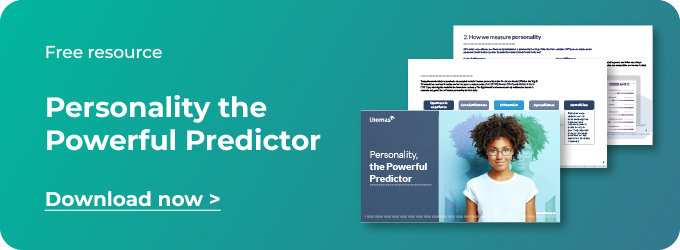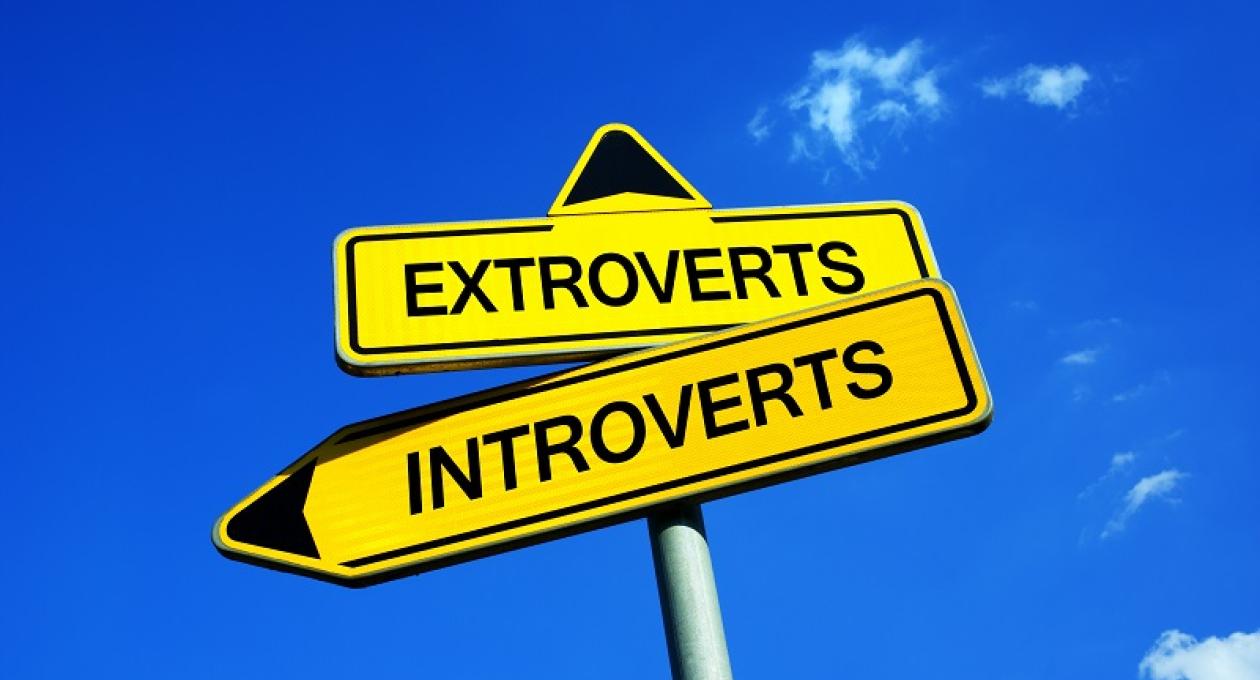OCEAN is a common acronym that is widely used to describe the five big traits that help define personality types. Openness, Conscientiousness, Extroversion, Agreeableness, and Neuroticism make up the big five and can provide employers and recruiters with useful insight into a candidate or colleague that will also help predict future career success or potential business disruption.
Extroversion is one of the most commonly understood personality traits but in today’s guide we are going to dive deeper into this personality type. We are going to take a look at how extraversion can influence behavior in the workplace, what can make someone an introvert or an extrovert and how Thomas International can help you assess and measure a person’s level of extroversion.
Throughout today’s guide, you will see different spellings of ‘extrovert’ and ‘extravert’ as well as ‘extroversion’ and ‘extraversion’. These are just differences in spelling which don’t alter the meaning of the word; they are interchangeable and bear no difference in analyzing a candidate’s personality.
What is extroversion?
Extraversion is a measure of how energetic, sociable and friendly a person is. Extraverts are commonly understood as being a ‘people’s person’ drawing energy from being around others directing their energies towards people and the outside world. Often seen as the ones talking the most in a social situation, extraverts are traditionally characterized by sociability, talkativeness, assertiveness, and excitability.
It is however unfair to think that extroverted people are attention seekers. On the contrary, they are gaining energy from their social interactions and extroverts need social stimulation to feel energized.
We will all encounter an extraverted person in our lives, whether professional or personal. Importantly this personality type thrives on excitement and are generally very enthusiastic about social interactions. Impulsive in nature, extroverts prefer to do an activity rather than ponder or think about doing something.
Important to note is how an extraverted individual will or can impact behavior in a workplace. We will take a closer look at this shortly however, the main points to note include:
- Extroverts enjoy being around people and larger social groups. A workplace environment that is suited towards cooperation, teamwork and even allowing space for this personality to thrive is essential.
Extroverts also enjoy talking a lot; this is where they gain ‘energy’ to go about their day and complete their tasks. This could be more problematic in a workplace that deals with more data led and analytical environments where distractions can be problematic to completing tasks.
Introvert and extrovert personality traits
Of course there are different traits for introverts and extroverts and importantly the way that these are understood and analyzed can make a significant difference in the way that an individual can respond to a workplace environment or the choices they make in selecting a career.
Extroverted personality traits
- Enjoying social situations
This includes but is not limited to the workplace. Extroverts will introduce themselves to strangers easily and rarely avoid unfamiliar situations.
- Don’t like alone time
Being away from other people can be draining in a different way for extroverts. They gain their energy by being around others.
- Make friends easily
Extroverts find it easy to introduce themselves in social situations and you will also notice how big a social network an extravert will have because of this.
- Aren’t afraid of risk
Extraverted individuals tend to take more risks than introverts. Trying and failing is more appetizing than not trying at all.
Introverted personality traits
- Dislike being the center of attention
In contrast to the extrovert, the introvert finds social situations somewhat difficult and if any attention is directed their way or they are singled out, this can cause a lot of social discomfort.
- Introspective thinkers
Introverts like looking inwards and analyzing themselves, their behavior or even something that has happened in the day and especially before taking any further action or steps.
- Enjoy alone time
Whilst the extrovert finds alone time discomforting, the introvert is a different person altogether. Having that time to unwind by themselves allows them to process emotions and self calm in a way that an extrovert would struggle with.
How extroversion in personality influences behavior in the workplace
Extroversion can affect behavior in the workplace. Through years of analysis and even anecdotal experience from managers and recruiters, extroverted personalities can have both a positive and negative influence in the workplace.
The extroverted subtraits include, friendliness, assertiveness, openness, positivity and excitement seeking.
Friendliness
Extroverted people make friends easily and enjoy getting to know them. They can build conversations and easily make contacts. Finding genuine interests and topics to talk about gives extroverted people the energy they need to function in a social environment.
Assertiveness
Extroverted people tend to be more assertive which makes them natural leaders. You may see this as a pushy personality but in fact, extroverts look at situations with a more positive outlook and believe that they can get the job done.
Positive
Extroverts tend to be cheerful and have a positive outlook which can positively affect the people around them - a good teamwork scenario where the stress of the job or the role can be draining.
Openness
Extraverted individuals tend to be more open about their personal life, openly discussing what is going on. Sometimes this can be distracting for teams or others in the workplace so it must be managed carefully.
Excitement seeking
Extroverts enjoy a fast paced life, filling their social calendar and not sitting for too long on decisions. This can be a plus or minus for those in leadership positions who may need more time to make a decision and move the business forwards.
What makes a person extrovert or introvert
This is a question that neuroscience and psychologists have tried to answer through years of study and analysis. Whilst many argue that extroversion or introversion are on a sliding scale, what is important to note is that there are a few different ways of analyzing this question.
Fundamentally this all boils down to nature vs nurture. Is it that a person becomes extroverted or introverted through how they grow up or is there a genetic component that influences this more than we might think? Studies have shown that there is a strong genetic link to extraversion, contributing somewhere between 40% and 60% of the variance between extroversion and introversion. Twin studies have shown that individual experiences carry greater weight than shared experiences in families [1].
Because extroversion or introversion can be part of your personality which can change over time, (you may be less social as a child but not as an adult for example) many social psychologists have coined ambiversion to explain this personality trait. There is a little more to ambiversion however.
Ambiverts can be both extroverted and introverted and can flip into either depending on their mood, content and goals. For example, an ambivert can be in the camp of liking company or time by themselves depending on their situation or circumstance.
You will have heard of terms such as outgoing introverts or anti-social extroverts. This is just another way to describe ambiversion. It is better understood as extroversion as seen on a sliding scale.
There have been many neuroscience studies which also show that the brains of extroverts and introverts differ. One prime example is when dopamine floods the brain of both extroverts and introverts and the different reactions that take place. Whilst both personalities will talk more and take more risks, extroverts will respond more to this stimulus and can even channel it greater than an introvert.

Advantages of of the extravert personality trait
There are many advantages of having an extroverted personality. From finding it easier to get a job to even more success in personal life such as dating. Here are some of the other advantages to extraverted personalities.
- Find it easier to establish valuable relationships
- Able to guide conversations
- Higher levels of confidence
- Generally cheerful and upbeat
- Find it easier to start conversations with strangers
- Have larger social networks
- Can be characterized as having an “aura”
- Can lead conversations in a desired direction
- Is generally easier to be understood through language
There are however some of the downsides of extraversion such as:
- Don’t always work well in solitude or alone
- Manner can be annoying to others
- Overconfidence
- May take excessive risk
- Can be an exhausting personality type
- Can be over the top and thus, exhaustive
- Rely for other people to be happy to find satisfaction
How Thomas assessments measure workplace personality
The Thomas workplace personality assessment can be used to understand a candidate or employees extraversion, and wider personality.
Thomas workplace personality assessment can be used to understand a candidate or employees level of extraversion, and wider personality by using the globally recognized and respected big 5 psychological theory. The High Potential Trait Indicator (HPTI) as we also call it, can also help to identify leadership potential.
Developed by Ian MacRae and Adrian Furnham in 2006, the HPTI has been designed based on an ‘optimality’ model, which assumes that personality traits can be considered ‘optimal’ based on the requirements of a particular job role or position, such as senior executive leadership.
Whether you are looking for the next superstar to join your team, possibly even start to change team dynamics or you want to measure the level of extraversion in your workplace, the HPTI assessment can analyze all the data in one place giving you insight in minutes.
In summary
Extroversion is a measure of how energetic, sociable and friendly a person is. Extroverts are commonly understood as being a ‘people’s person’ drawing energy from being around others directing their energies towards people and the outside world.
Social scientists have spent years studying extroversion and how much this is impacted by both nature and nurture. There are advantages and disadvantages of being extroverted and over time, one can become more extroverted or introverted or, many can also fit into the category of ambiversion - where both extrovert and introvert tendencies can comfortably sit.
Being able to accurately assess how extroverted and introverted a candidate or employee is can help organizations understand team dynamics and where the business can create a working environment that works for everyone. Visit our workplace personality page to find out more.
Sources:
1. https://www.verywellmind.com/what-is-extroversion-2795994






